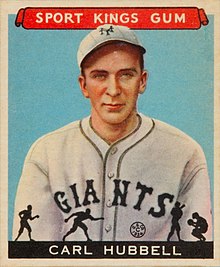Carl Hubbell
| Carl Hubbell | |||
|---|---|---|---|
 |
|||
| Pitcher | |||
|
Born: June 22, 1903 Carthage, Missouri |
|||
|
Died: November 21, 1988 (aged 85) Scottsdale, Arizona |
|||
|
|||
| MLB debut | |||
| July 26, 1928, for the New York Giants | |||
| Last MLB appearance | |||
| August 24, 1943, for the New York Giants | |||
| MLB statistics | |||
| Win–loss record | 253–154 | ||
| Earned run average | 2.98 | ||
| Strikeouts | 1,677 | ||
| Teams | |||
| Career highlights and awards | |||
|
|||
| Member of the National | |||
|
|
|||
| Inducted | 1947 | ||
| Vote | 87% (third ballot) | ||
Carl Owen Hubbell (June 22, 1903 – November 21, 1988), nicknamed "The Meal Ticket" and "King Carl", was an American baseball player. He was a member of the New York Giants in the National League from 1928 to 1943. He remained on the team's payroll for the rest of his life, long after their move to San Francisco.
Twice voted the National League's Most Valuable Player, Hubbell was inducted into the Baseball Hall of Fame in 1947. During 1936 and 1937, Hubbell set the major league record for consecutive wins by a pitcher with 24. He is perhaps best remembered for his performance in the 1934 All-Star Game, when he struck out five of the game's great hitters in succession. Hubbell's primary pitch was the screwball.
Hubbell was born in Carthage, Missouri and raised in Meeker, Oklahoma. He was originally signed by the Detroit Tigers and was invited to spring training in 1926. However, pitching coach George McBride and player-manager Ty Cobb weren't impressed with him. Additionally, they were concerned about his reliance on a screwball, a pitch that some believe places an unusual amount of stress on a pitcher's arm. Hubbell was sent to the Toronto Maple Leafs in the International League before the start of the season. He went 7–7 on a championship team. In 1927 he was invited to spring training again with Detroit, but the Tigers still weren't impressed and sent him two steps down the minor-league ladder, to the Decatur Commodores of the Illinois–Indiana–Iowa League. Despite a 14–7 record, the Tigers didn't invite him back for 1928, and he was sent to the Beaumont Exporters of the Texas League.,
...
Wikipedia
